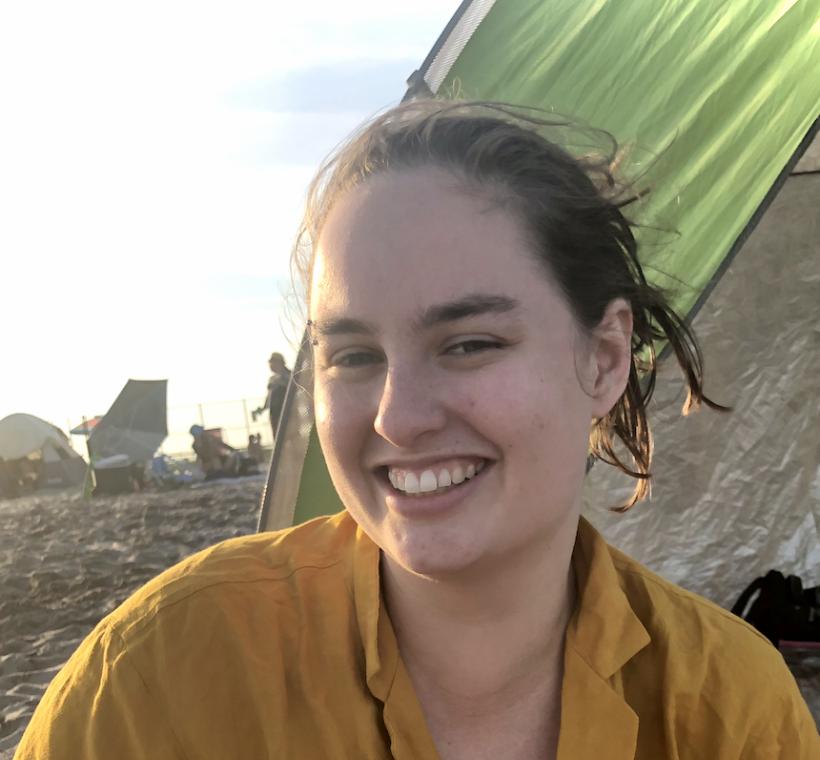
Taylor Cook
Tell us about yourself:
I am a freelance audio producer and activist living in Brooklyn, NY. I have a professional background in climate justice advocacy and labor organizing and I recently completed a graduate program in disability studies at CUNY.
I’ve been making audio ever since college, where I got my start by hosting a weekly radio show and convincing as many of my professors as I could to accept sound pieces in lieu of term papers. My work thus far has centered around topics of disability, queerness, and community organizing and has recently been featured on the Brooklyn Public Library podcast, Borrowed and the BRIC podcast, Brooklyn, USA.
A piece of yours or project (in any medium) that you'd like to share.
“No Scarcity of Care” is a story I produced about my friend Una Aya Osato’s experiences navigating long covid and finding community with other chronically ill people. This is an abbreviated version of a longer piece I made for the podcast Brooklyn, USA.
What draws you to storytelling?
Getting the opportunity to know people on a deeper level and to learn more about their lives is absolutely my favorite part of this work and I feel incredibly honored when people trust me with their stories.
As a storyteller, I work to tell stories that center marginalized people and don’t just focus on pain, trauma, and oppression, but also on pleasure, community, and resistance. I think it’s vital that our stories reflect the realities of our lives and the systems of power that shape them, while also holding space to imagine new possibilities.
What excites you the most about being a New Voices Scholar?
Getting to meet and connect with the other people in my cohort and in the New Voices community has been amazing. I am inspired by everyone in this group, the incredible creative projects they are making, and all the work they are doing to make this industry more safe, equitable, and accessible.
What’s playing on your radio/audio streaming service right now?
I’ve been listening to and highly recommend the podcast The View From Somewhere. It challenges the value placed on “objectivity” in journalism, critiques extractive and oppressive practices throughout the industry, and offers movement journalism as an alternate model. I’ve found it really useful in thinking through many of the ethical questions that have come up for me in doing this work.
Some other shows in my regular rotation are Gender Reveal, Death Panel, The Brian Lehrer Show, Who Weekly, and How to Survive the End of the World.
What’s the most underrated tool (technical or not) that you use in your creative process?
Talking through ideas and getting feedback on my work from other people always helps me get perspective on what works and what doesn’t. These discussions help me zoom out from the technical minutia and look at a piece holistically. I am especially grateful to my non-audio producer friends who take the time to listen to drafts of my work and share their notes.
Also, taking breaks, going for walks, and listening to music are really vital parts of both my creative process and my self-care.
What is something you want to see more of in the industry?
So many things! I’d love to see more people of color, trans people, and disabled people in leadership positions; more organizations making an active effort to hire, promote, and retain marginalized people; more people speaking out against racism, ableism, and sexism; more well-compensated internships and entry-level positions; more support for and solidarity with unions; more trauma-informed reporting.
Who/What are your radio/audio inspirations and why?
I am inspired by everyone working to challenge ableism in this field. I particularly admire Alice Wong, creator of the podcast Disability Visibility, and all of the work she does to platform and advocate for disabled people. I also want to highlight Rose Eveleth’s work to routinely incorporate disability analysis into their show Flash Forward. Disability is often siloed and only discussed in one-off features or episodes, so it is refreshing to hear a podcast that is not explicitly about disability engaging with disability as a vital and valuable framework.
Anything else you'd like to add?
If you want to get in touch, please reach out to me through my website or on Twitter @taylormcook7